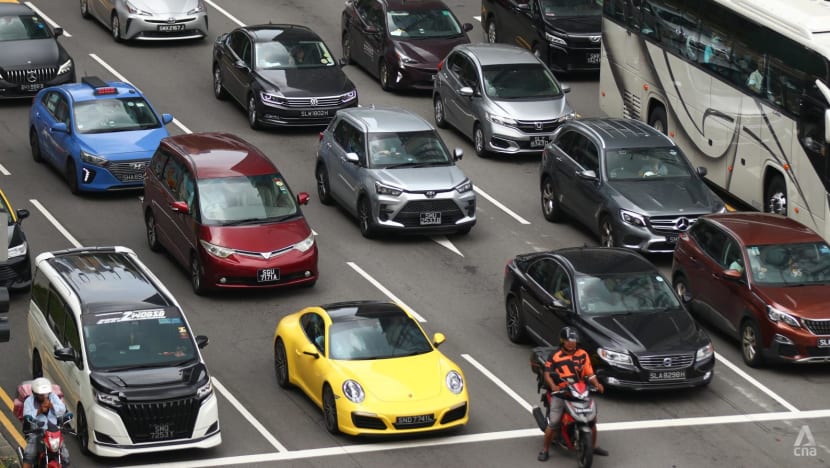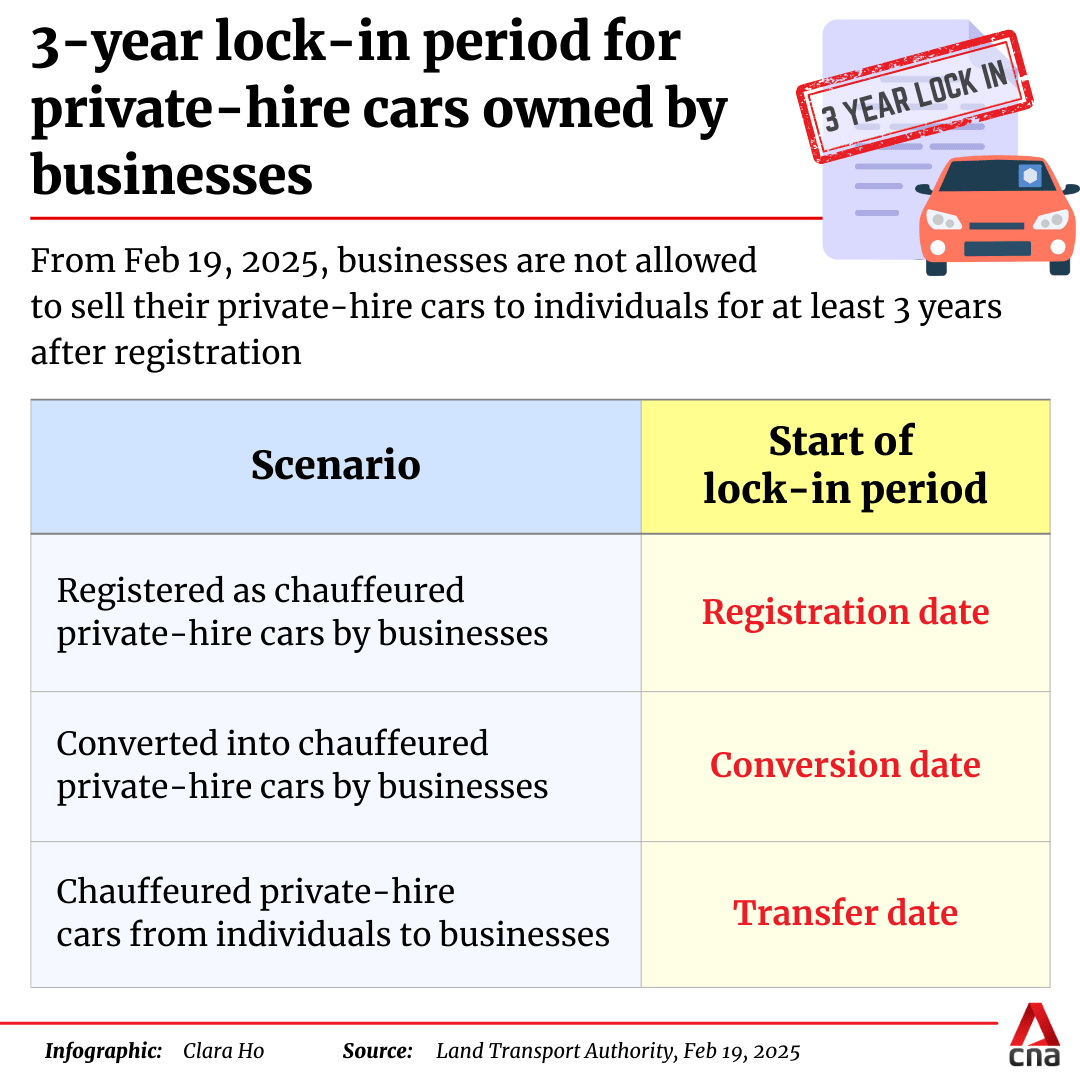New business-owned private-hire cars from Feb 19 cannot be transferred to individuals for 3 years
The lock-in period will apply to vehicles that have their Certificates of Entitlement (COE) issued as part of the ongoing bidding exercise, which closes on Wednesday (Feb 19).

Vehicles in Singapore. (File photo: CNA/Syamil Sapari)

This audio is generated by an AI tool.
SINGAPORE: From Wednesday (Feb 19), businesses in Singapore must keep their private-hire cars designated for ride-hailing services for three years, before they can be converted or transferred to individuals.
This new rule ensures that businesses who acquire such private-hire cars do so predominantly for the purpose of leasing them to drivers who provide ride-hail services, the Land Transport Authority (LTA) said in a news release.
This also prevents the premature conversion of such vehicles out of the chauffeured private-hire car (PHC) scheme, which will affect the supply of vehicles available for point-to-point (P2P) services.
The mandatory three-year lock-in period applies to all newly registered or converted chauffeured private-hire cars that are owned by businesses, and all such vehicles that are transferred from individuals to businesses.
It will also apply to vehicles that have their Certificates of Entitlement (COE) issued as part of the ongoing bidding exercise, which closes on Wednesday.
LTA had originally intended to announce the new requirement after the current COE bidding exercise.
“However, due to an unintended release of information by our vendor NCS, which should not have happened, some industry players received notification of this new lock-in period before the planned announcement date,” the authority added.
“To ensure transparency and fairness for all stakeholders, LTA has decided to bring forward the implementation of this new policy to Feb 19, before the close of the COE bidding process.”
In response to CNA's queries on Wednesday, an NCS spokesperson clarified that a data leak had not occurred but rather it was due to a "deployment error" in implementing LTA's policy changes.
As such, the information was released on Feb 16, which was earlier than planned, instead of after the current COE bidding cycle, which ends on Wednesday.
"We are now working closely with LTA to ensure successful implementation of the new policy," said NCS.
FAQ on lock-in duration for business-owned chauffeured private-hire cars
Vehicle lock-in status
1. How would I be notified if the lock-in is applicable to my business-owned chauffeured private-hire cars?
Before a business initiates the registration or conversion of a chauffeured private-hire car, or the transfer of a such car to another business via the OneMotoring digital service, the system will display an acknowledgement field, if applicable. This message will inform vehicle owners that their business-owned chauffeured private-hire car will be subject to a lock-in period. Following the successful completion of the transaction, vehicle owners will receive a notification e-letter confirming the transaction and specifying the applicable lock-in duration.
2. How do I check the status of my business-owned chauffeured private-hire car's lock-in duration?
Vehicle owners may check the lock-in status of their business-owned chauffeured private-hire cars from the notification e-letter after successful registration, conversion or transfer of the vehicle.
3. How do I check if the business-owned chauffeured private-hire car that I intend to purchase is subjected to a lock-in duration?
Potential buyers may check the lock-in status of the business-owned chauffeured private-hire car with the seller.
4. I have a sole proprietorship. Will my chauffeured private-hire car be subject to the lock-in?
Chauffeured private-hire cars owned by business entities registered with the Accounting and Corporate Regulatory Authority (ACRA) with a Unique Entity Number (UEN) will be subject to the lock-in.
Registration of new business-owned chauffeured private-hire car
5. Will my business-owned chauffeured private-hire car be subject to the lock-in period if I register or convert it before Feb 19, 2025?
The lock-in period will not apply to business-owned chauffeured private-hire cars registered or converted before Feb 19, 2025.
6. If my business registers a chauffeured private-hire car after Feb 19, 2025, using a temporary Certificate of Entitlement (TCOE) obtained before Feb 19, 2025, will the lock-in period apply?
The lock-in period will not apply to business-owned chauffeured private-hire cars registered using TCOEs obtained before Feb 19, 2025.
Transfer of chauffeured private-hire cars from individuals to businesses
7. Will my business-owned chauffeured private-hire car be subject to the lock-in period if the application for transfer from an individual was submitted before Feb 19, 2025, but completed after Feb 19, 2025?
The lock-in period will not apply if the application for transfer had been successfully submitted before Feb 19, 2025.
8. An application for transfer was submitted before Feb 19, 2025. However, the transfer was unsuccessful due to various reasons, such as being unable to secure financing, and a new transfer was initiated on or after Feb 19, 2025. Will the chauffeured private-hire car be subject to the lock-in period?
The lock-in period will not apply to the earlier application for transfer submitted before Feb 19, 2025. However, it will apply to the new transfer application submitted after Feb 19, 2025.
Transfer of chauffeured private-hire cars between businesses
9. If a business-owned chauffeured private-hire car without an existing lock-in period is transferred to another business, will that vehicle be subject to a new 3-year lock-in duration following the transfer?
As existing business-owned chauffeured private-hire cars registered, converted or transferred before Feb 19, 2025 will not be subject to this lock-in period, their transfer to another business will not trigger a new lock-in period.
Under the new rule, business-owned chauffeured private-hire cars with an existing lock-in period can still be transferred to another business, and the remaining lock-in duration will be carried over to the new business.
However, business-owned chauffeured private-hire cars with an existing lock-in period cannot be transferred to an individual.
Senior Minister of State for Transport Amy Khor said in a Facebook post on Wednesday that LTA's latest move is part of a P2P industry review that started in 2023, with one area of focus being the stability of P2P supply.
"Today, PHCs can be converted in and out of the PHC scheme, to provide flexibility for PHC supply to respond to P2P demand. However, this also means that PHC supply is more volatile," Dr Khor noted.
Taxis, however, cannot be readily converted.

The new lock-in period is meant to bring about a more stable supply of vehicles that can be used to provide ride-hail services, Dr Khor added.
It will not apply to existing business-owned chauffeured private-hire cars registered, converted or transferred before Feb 19. Those vehicles can be transferred to another business without triggering a lock-in period.
Chauffeured private-hire cars that are owned by individuals will also be exempt. Such vehicles are typically used both for providing ride-hail services and for personal trips.
Dr Khor said more updates about the second phase of the ongoing P2P review would be shared in parliament in March.
In November last year, Transport Minister Chee Hong Tat said in parliament that the main driver for the increase in COE prices in recent quarters was likely due to strong demand from local individual buyers, and not foreigners or car leasing companies.
Mr Chee presented data on successful Category A and B bids from 2022 to October 2024.
In that period, Singapore residents accounted for the large majority of successful bids, increasing from 66 per cent in 2022 to 84 per cent as of last October.
The proportion won by car leasing companies, which bid for vehicles that are then leased out as private-hire cars, has also decreased from 26 per cent in 2022 when COE prices were relatively lower, to about 10 per cent in 2024.















